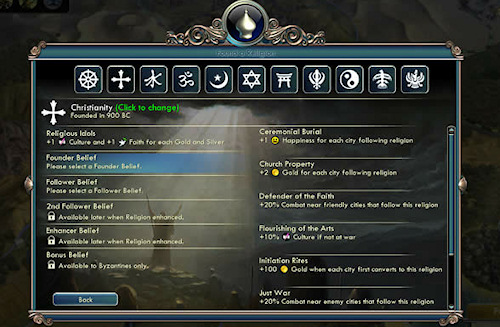If you've never played a Civilization game before, don't start now. Seriously, do yourself a favor and avoid playing any of the games in the series because you'll lose whatever free time you had to conquering the world in one of the most addictive turn based strategy games of all time. Civilization V came out in 2010 to mostly positive reviews, revitalizing the series with some pretty drastic changes to several core systems. Like every Civ game before it, Civilization V has gotten an expansion pack that tightens and balances gameplay, adds new units and features, and makes the game even more addictive. Let's see what Civilization V: Gods and Kings has to offer.
Civilization games have never been about story, in fact, there is no story. Instead you simply "play a game of Civilization" much like you'd play a board game. Winning comes in a variety of conditions - you can conquer all other civs through force, you can win the space race, you can build the Utopia Project via social policies, or you can use diplomacy to convince other nations you are their leader. How you get to these victory conditions is done through a variety of basic strategic elements that boils down to: science, money, army, diplomacy, and new to Gods and Kings is - faith or religion. While previous Civ games included a religious aspect, Civilization V: Gods and Kings utilizes faith as a resource much like culture or gold.

The level of complexity that faith adds to the game is quite astonishing, because you can really turn the tide of your empire just by having a lot of religious adopters. Let's start at the basics. Certain buildings will increase the faith of your empire. Once you amass enough faith, a Great Prophet will be born which allows you to create a religion. You'll start with picking a few bonuses for the religion - perhaps you worship harvest gods and gain food bonuses for followers in cities. Maybe you worship the war gods so any battle won near a city gives a growth bonus. Every city that is under your religion's influence, whether its your own or an opposing, will give you benefits. Later on you can add secondary benefits to your religion and you can even perform some religious espionage on opposing cities by sending in a special units to gain converts. You can even use faith to purchase units and buildings, provided you have enough.
There are nine total new Leaders and Civilizations to choose from in the expansion, including some which have bonuses to the new faith system. I played three different games with these leaders including Dido of Carthage, Pacal of the Mayans and Boudicca of the Celts. Each civilization has their own look and feel (as well as music) and all civilizations have two unique items only available to them - one unit and one building.

If all of that wasn't enough new for you there's a revamped diplomatic system that involves the return of the Spy unit, though unlike previous games, you don't create them. Instead the Espionage system is like a subgame within the game itself. The first step is to establish embassies in foreign nations via diplomacy, once completed you can send in a spy to find out what's going on. He'll feed you all kinds of information like whether a leader is amassing an army, stockpiling a resource, or various other dealings. If you choose you can have the spy attempt to steal technology but risk being caught damaging relations. You'll need to move your spy from city to city and as he carries out tasks he'll level up and become more efficient.
The final change is the city-state system has been revamped. Now these one city nations actually serve a purpose instead of just eating up territory. You'll get "quests" from them - a simple clear this barbarian encampment or asking for investments. Completing these quests in a timely manner will earn you some sort of tangible reward, usually in the form of a unit.
